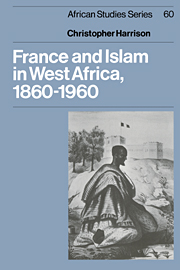Book contents
- Frontmatter
- Contents
- Acknowledgements
- Abbreviations
- Map
- 1 Introduction
- PART I 1850–1898: NINETEENTH-CENTURY ORIGINS OF FRENCH ISLAMIC POLICY
- Introduction
- 2 French Islamic policy in Senegal and Algeria
- PART II 1898–1912: THE FEAR OF ISLAM
- PART III FRENCH SCHOLARSHIP AND THE DEFINITION OF ISLAM NOIR
- PART IV 1920–1940: THE FRENCH STAKE IN ISLAM NOIR
- Notes
- Bibliography
- Index
2 - French Islamic policy in Senegal and Algeria
Published online by Cambridge University Press: 01 February 2010
- Frontmatter
- Contents
- Acknowledgements
- Abbreviations
- Map
- 1 Introduction
- PART I 1850–1898: NINETEENTH-CENTURY ORIGINS OF FRENCH ISLAMIC POLICY
- Introduction
- 2 French Islamic policy in Senegal and Algeria
- PART II 1898–1912: THE FEAR OF ISLAM
- PART III FRENCH SCHOLARSHIP AND THE DEFINITION OF ISLAM NOIR
- PART IV 1920–1940: THE FRENCH STAKE IN ISLAM NOIR
- Notes
- Bibliography
- Index
Summary
In late 1854 Faidherbe was appointed Governor of Senegal with instructions to pursue a policy of expansion into the interior of the colony at minimum cost to the treasury. Within months of his appointment he had successfully brought an end to the war with the Trarza Moors thereby establishing French control over the lower valley of the Senegal River. Faidherbe then waited for the river level to rise to enable him to continue his advance upstream. He immediately made inroads into the Umarian domination of the upper river valley by establishing alliances with Umar's enemies in Medine and Bundu and constructing a fort in Medine. However, back in St Louis the French were acutely aware that Muslims greatly outnumbered Christians and there was very real concern within the French community that the local Muslim population would answer Umar's call issued in early 1855 to reject French rule. This concern was translated into a wide range of opinions about what policy the French authorities should adopt towards Muslims within the town of St Louis. Education policy, which had been the subject of quite heated debate for a number of years, became the litmus test of French attitudes towards Islam in the colony.
There were certainly those amongst the French community who argued that no concession at all should be made towards Muslims. Others expressed pious hopes that eventually French education would train a new class of pro-European Muslims on whom the colonial power could call for support.
- Type
- Chapter
- Information
- France and Islam in West Africa, 1860–1960 , pp. 11 - 24Publisher: Cambridge University PressPrint publication year: 1988

